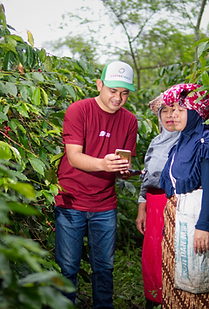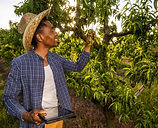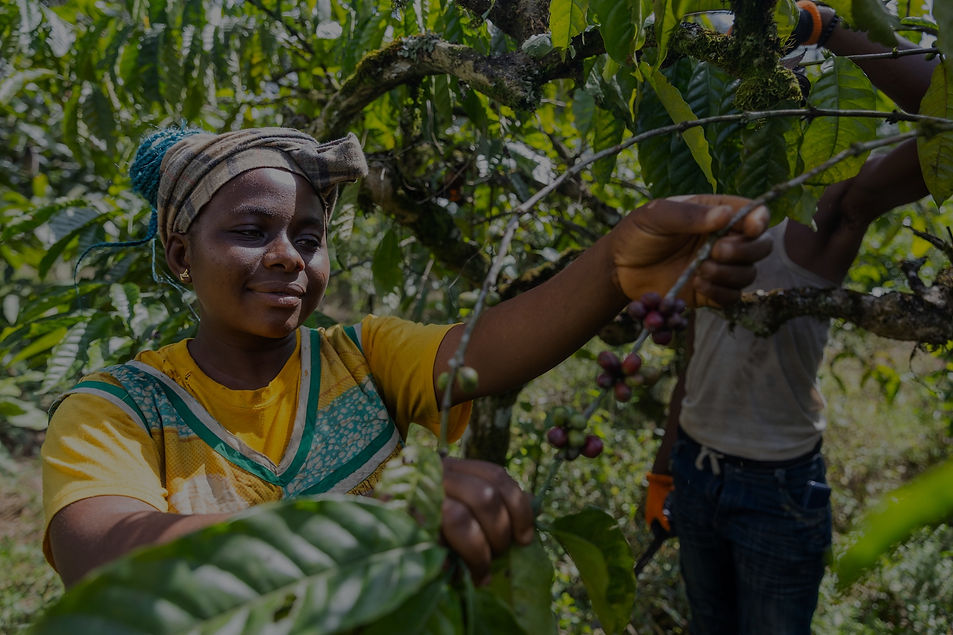
Driving Sustainability in Global Supply Chains:
Our Boots-on-the-Ground Approach

Unlock full visibility of your sourcing with precise producer surveys & verification that trace the origins of your products, verify sustainable farm practices, and measure emissions. Stay ahead of evolving global standards regulations, while ensuring compliance and building trust across your supply chain.
SUPPLY CHAIN MAPPING
AND VERIFICATION

Combines group trainings on sustainable farming with individual coaching supporting households in implementing practical farm development plans. It empowers households to successfully execute farm development plans, improve yields, and contribute to resilient, climate-conscious, and socially responsible farming communities.
TRAINING AND
COACHING

Field engagement & capacity building support for supply chain actors (local aggregators, cooperatives, financial service providers, nurseries, and agri-input suppliers) while enabling digital record-keeping, promoting Good Agriculture Practices (GAP), support digital & financial inclusion to foster efficiency, sustainability, and long-term collaboration.
BUSINESS
SUPPORT

Providing end-to-end support to prepare producers for leading sustainability certifications, including Rainforest Alliance, RSPO, 4C, and FSC. Include training, documentation, compliance verification, and continuous guidance—ensuring producers meet rigorous standards and gain market recognition through certified sustainable practices.
CERTIFICATION PREPARATION


Trace Every Step: Supply Chain Mapping & Verification
for End-to-End Transparency
Producers and Household-level Profiling
Go beyond basic data. By capturing detailed insights into producers data, households members, and labor information, we uncover the human story behind every farm. This holistic profiling strengthens transparency, safeguards human rights, and drives responsible sourcing across agricultural supply chains.
Farm Assessments
Through comprehensive farm surveys, we evaluate producers’ adoption of sustainable practices while gathering vital insights on production potential, farm diversity, land legality, soil health, and environmental risks. Additional assessments can measure greenhouse gas emissions and living income for deeper impact analysis.





Geo-Reference Mapping
Accurately map farms with geo-location data captured through GPS points or polygons as field agents walk plot boundaries. This precise mapping supports land legality verification and enables compliance checks against cut-off dates defined in NDPE commitments and regulatory frameworks.

Data-Driven Training & Coaching Tailored to Producers’ Needs for Sustainable Impact
Good Agriculture Practices (GAP)
Training enhances yields through smarter farming methods, reduced chemical dependency, and improved soil management. Producers apply correct post-harvest processes, conserve scarce water resources, and protect surrounding ecosystems, creating a balanced approach that elevates farm productivity while safeguarding environmental health and food security.
Climate-Smart & Regenerative Agriculture
Programs instill climate-smart techniques that strengthen adaptation to changing weather patterns, while regenerative practices restore soil organic matter and biodiversity. By actively mitigating greenhouse gas emissions, producers transform farms into resilient, future-ready ecosystems that sustain both livelihoods and the environment.
Code of Conduct
(CoC) Training
Training sessions clarify compliance requirements for global sustainability standards and certifications. Producers engage with principles addressing human rights, labor conditions, and social accountability, enabling ethical practices that enhance credibility, secure certification readiness, and reinforce trust throughout international supply chains.

Driving Sustainable Growth Through
First-Mile Business Support Across Supply Chains

Product Traceability Verification
Koltiva’s Field Agents ensure product segregation and quality control by monitoring supply chain actors from seed to table, guaranteeing traceability along the entire supply chain.

Certification
Management
We support certificate holders in managing certification cycles, preparing relevant documentation, conducting external audits, and overseeing premium distributions.

Agri-input Seller
Support
We help local nurseries and agri-input sellers professionalize their operations. Our coaches work with owners to promote best practices and monitor replanting efforts on farms.

Land Legality
Support
By working hand-in-hand with local governments, producers gain the land legality documents needed to protect tenure rights, reduce risks, and unlock opportunities for financing, certification, and sustainable long-term growth.
Enhancing Smallholders’ Land Legality
Smallholder producers often lack the required land legality. By combining precise polygon mapping with collaboration from local governments, Koltiva supports producers in obtaining legal land documents—ensuring compliance with sustainability standards and unlocking opportunities for certification, finance, and long-term security.
Certification Readiness for Sustainable and Responsible Farming
Empowering farming communities with practical tools and continuous guidance to improve practices, strengthen resilience, and achieve internationally recognized certification standards.
Capacity Building for Management and Members
Empowering certification units through group training that equips both management and members with practical knowledge of sustainability standards, ensuring shared understanding, stronger compliance, and collective commitment to achieving and maintaining certification.
Internal Control System for Certification
Strengthening certification from within. Koltiva equips Certification Units with the skills and tools to design, implement, and maintain robust internal control systems—ensuring long-term compliance, credibility, and continuous improvement across sustainable supply chains.
Establishment of Certification Units
Working hand-in-hand with local communities, Koltiva facilitates the identification and formation of prospective certification units, laying the foundation for RSPO/ISPO certification and advancing sustainable, inclusive practices across agricultural landscapes.





